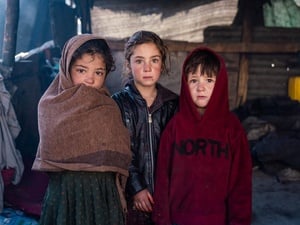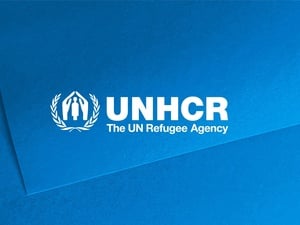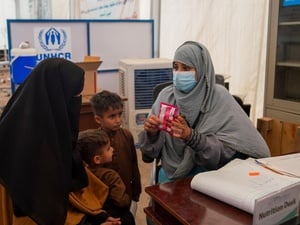Up to 30,000 Iraqis gather near border with Iran
Up to 30,000 Iraqis gather near border with Iran

Displaced Iraqis at the Mehran border have so far made no effort to cross into Iran.
MEHRAN, Iran, April 10 (UNHCR) - Up to 30,000 displaced Iraqis have reportedly gathered in an Iraqi border town near western Iran, where they have received assistance but expressed no immediate plans to cross into Iran.
Responding to reports of the recent arrivals in Badrah, eastern Iraq, a UNHCR team on Thursday went to the Iranian border town of Mehran, 16 km from Badrah, and met with representatives of the displaced Iraqis.
The Iraqis said they had fled Baghdad and Nasiriya earlier this week and simply wanted to stay with relatives and friends in the area. Others had already been in Badrah for more than three weeks; some had even started returning to Baghdad after it came under coalition control.
The recent arrivals came in cars and buses, and were not carrying belongings. They said they had no immediate plans of crossing over into Iran.
Iranian authorities sent food, water and medicine to Badrah, a town of about 6,000 people. The food supplies included 7,000 cans of beans, 500 kg of dates, 2,000 packs of bread with 70 loaves each, and four water tankers. The governor of Ilam province, where the Mehran border crossing is located, has approached an Iraqi elder at Badrah to take charge of distributing the relief items.
More aid has been requested. At Mehran, the UNHCR team was told that trans-border operations to bring humanitarian aid to Badrah are being discussed by Iran-based relief agencies with Iranian and coalition authorities.
There have been no refugee arrivals reported in Iran since the war broke out in Iraq, but there have been reports of the presence of small groups of Iraqis on the Iraqi side of the frontier who have requested assistance but have made no effort to cross into Iran.
In the event of an Iraqi refugee influx, Iran's Bureau for Aliens and Foreign Immigrants (BAFIA) has prepared 10 campsites with help from UNHCR. Four of these sites, which can initially host 60,000 refugees, are building basic facilities like sanitation and water services. The other sites can be opened quickly if the need arises.
UNHCR has also stockpiled tents, blankets, jerry cans, kitchen sets and supplementary food in its warehouses in the western Iran cities of Kermanshah and Ahwaz.
"It is vital that anyone who feels unsafe or threatened during the war and the chaos that has engulfed various Iraqi cities be given the protection they need," said UNHCR spokesman Peter Kessler at a press briefing Friday in Amman, Jordan. "During this period of continued fighting in some areas and anarchy in others, desperate people fearing for their lives have the right to seek the protection of temporary asylum in a neighbouring country."
Iraqi taxi drivers arriving at Jordan's Al Karama border say they saw many people gathered at Ramadi, about two hours west of Baghdad. Other arrivals report that Iraqis are not being prevented from leaving, though there are reportedly many checkpoints along the route to Jordan.
Those who have so far reached Jordan's eastern frontier say that they are fearful of the growing anarchy and lawlessness. The UN refugee agency has been negotiating with the Jordanian authorities to allow 14 people, some of whom have been stuck in the no man's land on Iraq's frontier for several days, into Jordan's Ruwaished camp.
Among those stuck at Jordan's border with Iraq is one Iraqi man with three dependants who reached the border on Thursday. His wife and son were reportedly killed during the bombing campaign. Five other Iraqis are also at the border seeking entry into Jordan. Yet others include a Canadian citizen of Iranian origin and three Iranian refugees with French and German travel documents, as well as a Palestinian family.







